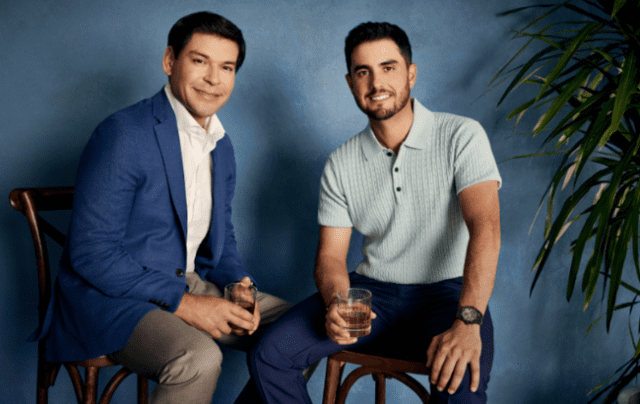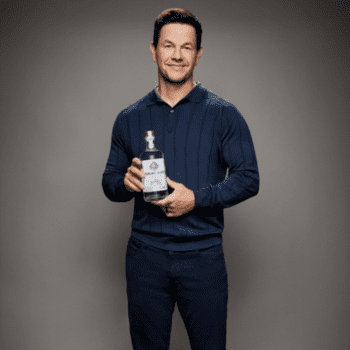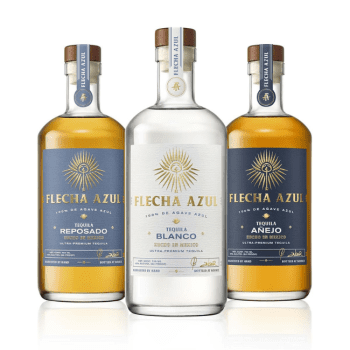SB meets… Aron Marquez and Abraham Ancer, Flecha Azul
The founders of Flecha Azul, entrepreneur Aron Marquez and professional golfer Abraham Ancer, talk to us about getting into the Tequila business and partnering up with movie star Mark Wahlberg.

How did you both meet and then decide you wanted to start a spirits brand together?
Marquez: Abe and I both have a passion for golf and we met at a Pro-Am – he does it for a living though, and I don’t. We’re both born in Mexico, raised in the US, and we graduated from the same college, Odessa in Texas, and the same university in Oklahoma. We have a lot in common. In between shots (of golf) where you wait for 30 minutes, we started talking about Tequila and lamented the fact that the quality wasn’t like the stuff we were used to from back home, with our grandparents and fathers.
Ancer: A good friend of mine was very close to the Orendain family and that’s sort of how everything happened – they are one of the four major families that basically pioneered Tequila in Mexico. They reached out to us and they really took us under their wing. They became like family. We’re very lucky to have something with so much tradition and knowledge behind it. It’s mine and Aron’s baby, you know, and for me personally, it’s the first thing that I’ve ever done outside of golf.
What separates Flecha from the rest of the premium Tequila pack?
Ancer: Compared to many brands coming out, we’re one of the world’s newest Tequilas authentically with Mexican roots; from us to the Orendain family to everyone at the distillery. The goal is to create an elegant brand that honours, obviously, our heritage, but tastes like the Tequila our grandparents grew up drinking, made with additive-free, single estate-grown and fully matured agave. You might say the market is a little saturated, but there’s a lot of room in the premium and additive-free space. The consumer is starting to wise up on this topic and many are noticing the difference between what’s quality and what’s not.
How did you get Mark Wahlberg onboard?
Ancer: Well, I met Mark the same way I met Aron, at a Pro-Am. Everything sort of ties back to golf. Years after that we sent him some Flecha as a gift. I knew he was a wine drinker, but not so much on the Tequila side. But he tried our product, learnt about it and really noticed the difference – especially with the additive-free aspect. I mean, he’s a healthy guy who works out twice a day, sometimes in the middle of the night, it’s pretty crazy.
While we were meeting in Jalisco, he was filming in the Dominican Republic, and we told him to stop by before he headed back to California. He came and met with us and the Orendain family, and a few weeks later he was part of the team. What we love about him is how hard he works. He doesn’t go out there and claim ‘this is my brand’, he just wants to help us.

What does having him on the team bring to the table?
Marquez: He’s so involved with the marketing side. Whatever he’s thinking in the middle of night, you’ll see it the next morning on social media. Because of Mark’s involvement, we sometimes get categorised as a ‘celebrity Tequila’, but we’re everything but that. One of the reasons, actually, why Mark came in was because he’s tired of the celebrities that suddenly become ‘Tequila experts’ even though they’ve never been to Mexico. Tequila isn’t an easy place to visit, but he came down and spent loads of time with us at the distillery. It showed me he was serious. Having him opens up so many doors and he’s a tremendous networker on top of it all.
Is there anything you would change if you could go back to day one?
Ancer: Looking back, we thought it was the greatest idea to put out all five SKUs at once, but now that we have gone through the whole process, maybe we could have gone little by little after the beginning with the blanco. We had to wait at least three years for the extra añejo to be ready. But there are no regrets.
Marquez: Launching first just with the blanco and reposado maybe because those two take the least time to age and produce. I don’t want to say we missed a window, but if we commercialised sooner, we would probably have a larger consumer base by this point – especially with people catching on to premium Tequila at that time. When you enter the market with five SKUs, it’s hard to highlight each one individually. That’s the only one where we would kind of look back and say ‘man, maybe we would have done that differently’. But also, we’re trying to come in with the full arsenal. We have friends that are whisky drinkers who drink añejo, vodka guys that drink the blanco and Scotch people that drink the extra añejo.
What eco-friendly practices have you put in place?
Marquez: The first time I went to Tequila, I saw that the jimadors who worked out in the field made very little per hour per day. We told the Orendain family to charge us three times what they normally pay – even though we pay the people who actually work in the fields, the costs of goods sold relative to finalising the package are still extremely low. From a governance perspective or social aspect, that was really important to us.
Then every time we make a purchase order (PO), we buy our Tequila from the Orendain family a year in advance. This allows them to build better infrastructure in the distillery – state-of-the-art equipment compared to what was there before – and this means we use 100% of the water that’s been processed, so there’s no waste at all. We use recycled labels with parts of agave that are filtered in the label itself. Everything from what’s in the glass to the corks to the woods and the labels, it’s all done with sustainability in mind.

Are you worried about the slowdown of growth for Tequila in the US?
Ancer: In the past three or so years, sales of Tequila just skyrocketed and it’s tough to keep that momentum going. Maybe it’s plateaued a little bit, but the overall sales are still going to be great and the category will still grow.
Any interest in releasing a mezcal?
Marquez: Look, mezcal is made in Oaxaca, Tequila in Jalisco. To me, it felt a little disingenuous for our Tequila brand to have a mezcal because it’s just too overlapped. It’s hard to be an expert in both. It’s just a completely different culture. We did consider it but we went for the cristalino instead. Both Abe and I agreed that we didn’t understand mezcal like we should and it didn’t feel right to introduce something we’re not familiar with.
What’s the end goal with Flecha?
Marquez: Year over year, we’ve grown over 100%. In 2024, we’re going to double again. The goal is to be a global brand and we feel like our product is superior to what’s on the market – and we really stand behind that.
Ancer: Also the quality has to remain the same. We’re not going to be sacrificing or cutting any corners to just put more bottles out there.
Related news
Two Stacks: relevance essential for driving growth
